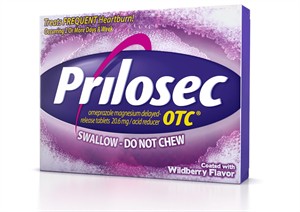
Procter & Gamble adds flavouring to its Prilosec OTC heartburn medication
NEW YORK, N.Y. – Procter & Gamble is adding a blast of fruit flavour to a pill that you swallow whole — a first for the world’s largest consumer products maker.
In the biggest change to heartburn medication Prilosec since it became an over-the-counter drug in 2003, Procter & Gamble is adding a berry flavour to the pill — even though the pill meant to be is swallowed, not chewed.
It’s a marketing gimmick more in line with the grocery aisles than the more staid medicine aisle and helps the pill compete more directly with flavoured traditional antacids like Tums.
P&G says the pills are coated with ingredients that give off a cooling sensation as soon as you put it in your mouth. And the wild berry flavour lasts for up to five minutes afterward in your mouth. The flavouring was derived from technology from P&G’s Vick’s segment.
P&G executives acknowledge that adding flavour to a pill you don’t even chew might not seem like an obvious move, but it is aimed at capturing more consumers as competition grows among the drugs known as proton pump inhibitors. The heartburn market is changing, as fewer consumers use antacids (like Tums or Pepto-Bismol), that neutralize existing acid, and more turn to medicines that block production of acid over time, like Prilosec and Zantac.
“Flavor, for many people seems surprising,” said Patrick Lockwood-Taylor, vice-president, general manager of North America Personal Health Care for Procter & Gamble. “But there are a lot of people who say, ‘Look, if I’ve got something that is functional, I want something extra.’ That’s what this flavour gives them.”
Cincinnati-based P&G says it is adding the flavour as a way to reach what it calls “experiential” consumers — the 30 per cent or so of the 50 million frequent heartburn sufferers in the U.S. that crave new flavours and sensations and will always pick up something new on store shelves.
Procter & Gamble is hoping to capture more of the market of people switching from antacids to proton-pump inhibitors. PPIs are heavily promoted and a fast-growing category.
Prilosec, first introduced in 1989, has about a 47.6 per cent share of the U.S. PPI market, according to research firm Euromonitor International, and is by far the biggest name in the growing category. Lockwood-Taylor said the aim is to keep that market share as the category itself grows. Store brands are second in the category and Novartis AG’s Prevacid, which was introduced in 1995 and became over-the-counter 2009, is third.
In the U.S., sales of proton pump inhibitors rose about 1 per cent to $965.7 million in 2011, while sales of antacids fell 2 per cent to $695.8 million, according to Euromonitor.
Wildberry Prilosec OTC began shipping to retailers this week and will be on store shelves beginning in October.
Join the Conversation!
Want to share your thoughts, add context, or connect with others in your community? Create a free account to comment on stories, ask questions, and join meaningful discussions on our new site.













Leave a Reply
You must be logged in to post a comment.